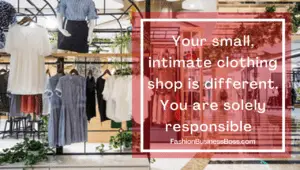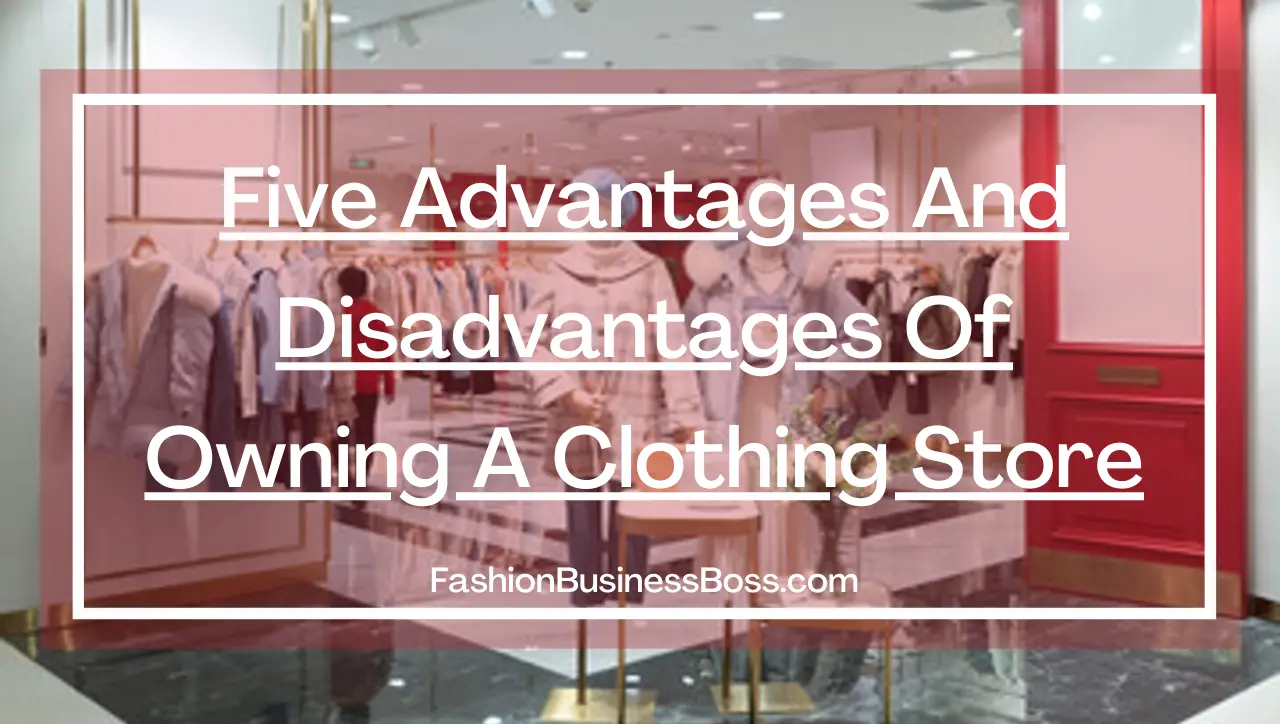In a world where starting a business may be a frightening experience, we are seeing a resurgence in clothing and fashion stores and boutiques. If you total both single-location establishments and multi-location chain stores, there are approximately 96,000 clothing stores in the United States alone, per First Research. These establishments also have a combined estimated revenue of around $168 billion annually. With the fashion industry looking more appealing than ever, it may seem like the perfect time to take the lap and open your clothing business. However, there are a few reasons why you may want to wait. Let’s discuss five advantages and disadvantages of opening a clothing store.
Five of the advantages of owning a clothing store include:
- Cash flow is much easier to control.
- You probably don’t have to purchase stock in large quantities.
- Expansion is easy and doesn’t require much capital.
- You are your own boss.
- Your store can recover from a loss easier.
Five disadvantages of owning a clothing store are:
- You will probably have a high turnover rate.
- You will have to follow the latest trends.
- Your location needs heavy foot traffic to succeed.
- The buck stops with you.
- Your profit margin may be lesser than other businesses.
In this article, I will explain to you five of the most compelling arguments for opening a clothing store as well as five disadvantages that may deter you from wanting to have a clothing store of your own. Some of the advantages may appear to be fairly obvious to you, while you may not have thought of fathers. The same applies to the disadvantages opening a clothing store. Let’s read along as I go into further detail about the advantages and disadvantages of opening a clothing store. Perhaps I can shed a little light on this subject, especially if you have been on the fence as to whether or not to open a clothing store of your own.
What Are Some Advantages Of Owning A Clothing Store?
Cash Flow Is Easy To Control

If I had to choose one advantage of owning a clothing store above all the others, it would be your ability to control your business’s cash flow. If you give it some thought, the fewer hands that you have in the register, the less likely you are to encounter many of the problems that come with too many hands in the till. Another perk to controlling the cash flow of your store is that you are more likely to have a better idea about the financial health of your business. Of course, this is something that you can solve rather easily by hiring an experienced accountant, but if you can save yourself that additional expense, why wouldn’t you?
You Don’t Have To Purchase A Lot Of Stock
There are lots of responsibilities that come with being the owner of any business. However, one additional responsibilities you may have as the owner of a small clothing store is that you are responsible for purchasing stock to keep in your store. Rest assured that this may be a significant advantage, as you can control not only what you purchase for your location but also how much you purchase. Owning a small clothing store means that you don’t have to buy lots of stock, which can free up some much-needed capital that may come in handy later down the line. There’s a certain freedom that comes with being in charge, and this is one of these perks.
Expansion Doesn’t Cost A Lot Of Money
Because the business operations of a small clothing store are fairly simple, they are amongst the easiest operations to scale. What does this mean to you? Well, I’m glad you asked. This means that if you want to expand your clothing business, it can be done fairly easily and without an enormous amount of startup capital. If you are successful with a standalone location, it should not be extremely difficult to replicate that success by expanding to another location. You should be also have a much easier time obtaining the necessary finances to expand if your business has a proven track record for success.
You Are Your Own Boss
One of the biggest perks of owning a clothing store is that you are your own boss. Small, independent clothing stores do not have a Board of Directors that are watching your every move. You are the boss. You make all of the pertinent decisions that come with the everyday operations of your business. When it comes to deciding who you should hire, the choice is yours. The same concept applies to making purchasing decisions. At the end of the day, your name is on the front door, so any and all decisions have to be made by you. There is a sense of freedom that comes with knowing that you are the boss, and you call all of the shots.
Your Store Can Recover From A Loss Easier

Another advantage of owning a small clothing business is that if you want take a loss on one collection, you can make it up quickly with the next collection. Fashion changes quite frequently, and this can be an opportunity to recoup losses you may have incurred on your last collection. Smaller locations usually take fewer risks, which usually results in losses on a smaller scale than with larger corporations. This gives you the opportunity to bounce back much more quickly than if your clothing store had a much bigger loss.
The Most Famous Clothing Brands: Top Five
What Are Some Of The Disadvantages Of Owning A Clothing Store?
Your Turnover Rate May Be High
One unfortunate circumstance that you may encounter as a clothing store owner is that you will probably have to combat a high turnover rate when it comes to your employees. While some people may enjoy working for a small business and prefer having a one-on-one relationship with their employer, this may not be the case for others. Most people are going to want the perks and benefits that come with working for a larger company, and you may not be able to provide those things if you are just starting out. If you have a small operation, you may not be able to give your employees the salary that a larger business can pay them.
You Will Have To Follow The Latest Trends
One of the biggest downfalls is having to stay on top of the latest fashion trends. This means that you will have to completely change your inventory at least twice a year, which may not be in the budget of a small clothing store owner. Unfortunately we, clothing and other fashion accessories generally have a six month life expectancy, which means that you will have to restock your store quite frequently. Once the items you sell fall out of style, they will often lose most of their value, which leaves you with inventory that you will have to take a substantial loss when selling it, if you are able to sell it at all.
Your Location May Depend On A Lot Of Foot Traffic
If your goal is to open a brick and mortar clothing store, your success will ultimately depend on where your store is located. When it comes to physical storefronts, location is everything. Your business is going to have to depend on foot traffic if it is going to be the success that you have been dreaming it can be. Try to find a good location that is on a busy street or in a bustling section of town. Your clothing store is going to have to rely on walk-in customers and impulse purchases for the majority of its sales when you are first starting out. Finding the perfect spot for your clothing store might not guarantee success, but it certainly can’t hurt your chances.
The Buck Stops With You

Perhaps the most significant disadvantage of opening a clothing store is that the buck ultimately stops with you. Larger chains and corporations have several employees as well as a Board of Directors who get the majority of the blame when a business does not succeed. Your small, intimate clothing shop is different. You are solely responsible for whether or not your clothing store succeeds. If it does not work out, you are solely responsible. However, on the bright side, if your business is a smashing success, you will get all of the credit.
Your Profit Margins May Be Low
Being an owner of a small clothing business means that you may find yourself having to face substantially low profit margins. According to Story, the gross profit margin for the an independent clothing store is approximately 43 percent. With gross profit margins this low, it can be quite difficult to expand, hire more employees, or maintain profitability. There are many things that can affect your business’s profitability, such as your rent or mortgage, utility expenses, employee salaries, or many of the other overhead expenses that your business can Incur. Low profit margins can also prevent you from jumping ahead of the curve by purchasing additional stock for your store.
Conclusion
Starting a small clothing store can be an exhilarating business venture. It provides you with the opportunity to be your own boss; recover easier from losses; expand your business with less capital; control your business cash flow, and purchase as much stock as you want. However, there can also be a few disadvantages to owning a small clothing store. Your profit margins may be significantly less than larger businesses; you are solely responsible for your success; you may have a high turnover rate; your location will be depend on heavy foot traffic to succeed, and you will have to follow all of the latest trends. Still, only you can decide whether or not to open a clothing store. Let me know how it works out for you…
How to Increase Your Profits in Fashion
Related Questions
What are some of the biggest disadvantages of selling clothes online?
One of the biggest issues you may face as a business owner is whether or not you will sell your clothing online. Some of the biggest disadvantages you may face when it comes to selling your products online include the following:
- No sense of personal customer service
- Extraordinarily high returns and exchanges
- Inconsistent shipping times
- You can’t sell your merchandise if your site crashes
- Legal guidelines vary from state to state
What are the most valuable fashion brands in the world?
There are literally thousands of clothing brands around the world. You may be familiar with some of them, while some brands may not be familiar to you at all. The most valuable clothing brands around the world include the following brands:
- Nike
- Louis Vuitton
- Hermes
- Gucci
- Zalando
To learn more about how to start your own fashion clothing line check out my startup documents here
Please note: This blog post is for educational purposes only and does not constitute legal advice. Please consult a legal expert to address your specific needs.

Meet Shawn Chun: Entrepreneur and Fashion Business Fan.
I’m a happy individual who happens to be an entrepreneur. I have owned several types of businesses in my life from a coffee shop to an import and export business to an online review business plus a few more and now I create online resources for those interested in starting new ventures. It’s demanding work but I love it. I do it for those passionate about their business and their goals. That’s why when I meet a designer or boutique owner at a craft fair, farmers market, retail location or anywhere else I see myself. I know how hard the struggle is to retain clients, find good employees and keep the business growing all while trying to stay competitive.
That’s why I created Fashion Business Boss: I want to help fashion business owners like you build a thriving business that brings you endless joy and supports your ideal lifestyle.

